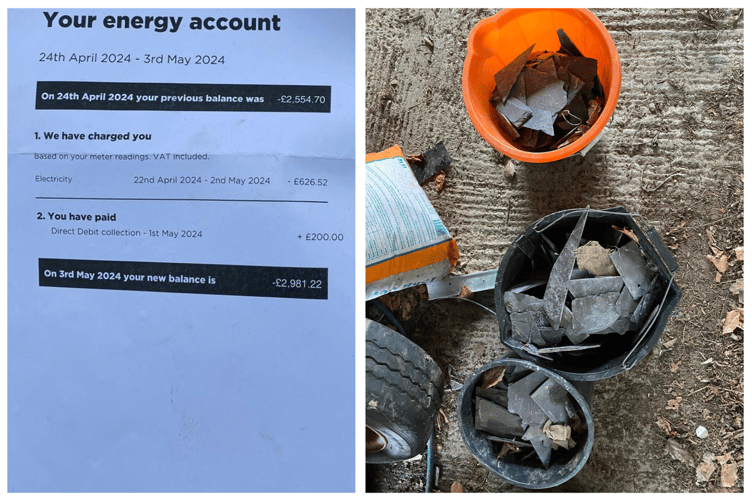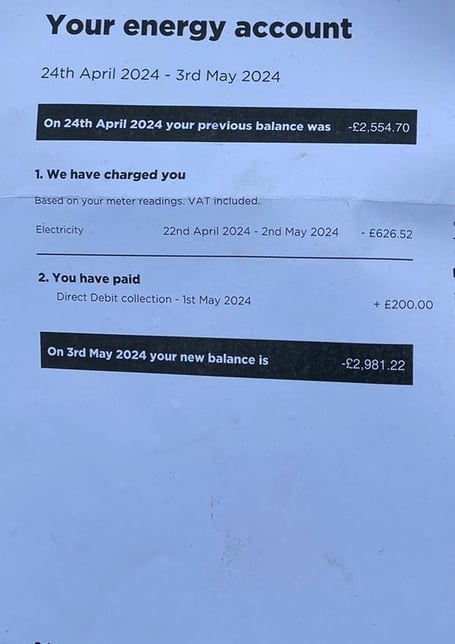The adverts are everywhere - ‘Slash energy bills and transform your home’, ‘Reduce your energy bills now’ and ‘Save up to 70 per cent’.
It’s easy to get sucked in by the promise of ‘100 per cent funded’ home energy upgrades like solar panels, insulation and electric air source heat pumps (ASHP) to warm your home as part of the UK government’s ECO4 scheme to help young families, the disabled, elderly or vulnerable.
But for some people, ‘transforming their home’ is the only accurate claim.

Rwth wanted to create a warm and sustainable home in her detached cottage in north Powys for her child and soon-to-be newborn. However, she ended up with a broken boiler and no electricity, heating or hot water from December 2023 - with still no repairs in sight.
Her installers, So Eco, realised halfway through the work that her house was ineligible for the installation having already ripped out the ceilings, electrical sockets, the boiler and radiators.
Rwth (pseudonym) was left with hanging light fittings, live wires sticking out of walls and installers who didn’t answer her calls - except to have a go at her.
Electrician Mark Clive took pity on her and refit what he could when sent out by So Eco, who still hasn’t paid him for his work.
Mark said: “It’s outrageous- these installers are in such a rush [to get the ECO4 funding] they’re not doing due diligence.
“They’re leaving chaos everywhere.
“The government wants us to go green but if this is the result, everyone will turn against green technologies.
“The biggest problem is that ECO4 installers are supposed to be overseen by other bodies, but nobody wants to get involved.”
Unfortunately, Rwth isn’t the only young family in Powys the Cambrian News has spoken to who have been left in debt and all-but homeless for months on end due to the state their houses have been left in, with the installers nowhere to be seen. Pensioners across Powys, Ceredigion and around the UK report being lumped with as high as £1,200 a month in electricity bills and leaking roofs.
The ECO4 scheme is a government incentive to get UK homes insulated - reducing their bills, transferring their oil or gas heating systems to electric - keeping the public warm, saving the planet and saving households money.

So Eco’s website promises to ‘reduce your energy bills’ but Rwth is about to fork out £3,700 for a brand new boiler to replace the one that broke during removal.
The ECO4 scheme aims to ‘tackle fuel poverty’ with eco-solutions- but it seems the £4 billion on offer has made these vulnerable households a target for installers who grab the ECO4 money and run off when things go wrong.
The Energy Company Obligation (ECO4) is the fourth iteration of a UK-wide government policy starting in 2013 which orders medium and large energy suppliers like British Gas and OVO Energy to fund and implement eco-friendly home heating measures to low-income, fuel-poor or otherwise vulnerable households.
Helping to contribute to the government's goal of reaching net zero climate target by 2050, suppliers do this by offering free or cheap installation of eco-energy-saving measures to eligible households and then divvy out the installation work to contractors.
Government regulator Ofgem, which administers the ECO4 scheme, has to confirm the measures have been correctly installed and suppliers have reached their targets a slice of the £4 billion is paid out, which is made of contributions from the largest energy suppliers in the country.
To help with quality issues in 2021 the government mandated that all installers delivering work under the ECO schemes, including So Eco, must be registered with TrustMark, a not-for-profit quality organisation that protects homeowners having work done.
Despite this, the work can be outsourced to freelance contractors who may not do “due diligence” to ensure the household and the house are compatible with the funding or technology.
As a consequence, The Cambrian News has spoken to many households left with inappropriately sized ASHPs, causing their electricity bills to skyrocket.
ASHP’s are a growingly popular alternative technology to fossil-fueled heating solutions.
Pensioner Brian Reynolds’ oil boiler was replaced with an ASHP by installer Consumer Energy Solutions (CES), who fixed his water tank to an uninsulated outside shed.
His bills tripled afterwards, going from roughly £30 a month for oil and £70 for electricity, to £280 a month for electricity. The 67-year-old ex-Royal Marine said: “The idea was to help with my bills and our environmental impact.
“I can’t afford to run the ASHP on my pension, I’ve been under a blanket using a fan heater all winter trying to keep warm.
“I’ve contacted my MP Ben Lake, I know he’s aware of others who feel conned... I was told I would save money on my bills.”

ASHPs run on the principle of ‘low and slow’ heating- keeping the house at a constant background temperature, saving energy by not turning the system on and off, or letting the property cool.
Abbie and her elderly mum in north Powys are in £3,000 debt with their energy company after their ASHP install, being lumped with breathtaking monthly bills of £1,200.
Abbie (pseudonym) says the pump was incorrectly programmed for their 200-year-old stone house by installers Warma UK.
On top of the bills, their slate roof is so damaged it ‘rains slates’ from a botched solar panel install, causing danger to them and Abbie’s grandchildren.

What’s more, the slates under the panels weren’t replaced, leaving only felt as protection against the Welsh rain. Her mum suffers from dementia, the aftereffects of a stroke and a poor heart.
Abbie said: “The damage they’ve done is incredible.
“It’s a joke, it’s grossly unfair.
“They leave you with everything upside down and you can’t get anyone who wants to touch it and put it right.
“I wish we’d never started on this journey.”
Having finally got through to Warma UK’s accreditor NAPIT, they found the new water tank needed removing as it’s inappropriate for their spring water supply.
According to experts, ASHPs work best with a well-insulated house, however as pointed out by retrofit coordinator Greg Collier-Jones from Severn Wye Energy Agency, they don’t have to be - the National Trust use ASHPs in an increasing number of their listed properties, complete with drafty windows and uninsulated walls.
This means the single-glazed hundreds of years old Welsh stone cottages may be more suitable for ASHPs than some think.
Greg from Severn Wye, a charity that supports people with their energy transitions, said: “Any property can have a heat pump.
“It comes down to costs and balancing them- if you’re replacing a coal heating system your costs will definitely decrease.
“If you’re replacing a gas or condensing oil boiler, however, it’s likely that costs will increase based on current electricity tariffs.
“For people installing ASHPs, solar panels can be added to offset the bills over the summer.
“We normally say houses should be well-insulated and draught-proof, but sometimes ASHPs will still be better than what they’re replacing.
“Ultimately they’re not ideal for everyone and so it is a pity the government currently has a one-size-fits-all policy to low-carbon heating."
In 2023 a record number of heat pumps were installed, 19 per cent more than in 2022, with the government aiming for 600,000 to be installed per year by 2028.
According to tech charity Nesta, in 2023 satisfaction levels for people with boilers were similar to households with heat pumps.
In 2022 research found that the cost of buying and running an ASHP across its lifetime broke even for the first time compared with the cost of buying and running gas boilers, which were previously cheaper.
Greg said other problems include some installers not fully understanding how to use ASHPs effectively, so not being able to give clients all the information they need: “ASHPs are not designed to be used in the same way as other heating systems- you can’t turn them off and on in the same way as this will cost more.
“You need to understand your energy use and get on the right tariff with an energy supplier.
“This funding has been very stop-start with hard deadlines- I think this is one thing causing issues- companies are forced to rushing but retrofitting should be done very carefully.
“I’ve seen it a lot when funding comes up - these companies operate for 10 years, make loads of money, get into trouble, disappear and then reappear with another name.”
Jade Craswell, Energy Advice Manager at Severn Wye, said: “ECO funding can be a really good thing- the majority of households have had a great experience and end up with homes performing better, but we do hear about cases where things haven’t gone as expected.
“I’m aware of installers who are commercially minded and calculate how to maximise the funding for them rather than focusing on the client. “It’s important that households identify installers who know their stuff and care about doing the best job.”
The Severn Wye team suggest finding a trusted installer from your local authorities recommended list- however this may not necessarily be the smart thing to do.
Ceredigion County Council lists installer CES, however CES is the same installer called out last month on S4C.
The programme cited 11 vulnerable households who were left on their knees by botched installs, leaving one man considering suicide because of the stress of debt collectors knocking on his door due to his sky-rocketing electricity bills.
For all the complaints The Cambrian News has heard, the most striking issue has been the lack of uptake with regulating bodies, from Ofgem who administers the scheme, to TrustMark and MCS who accredit the installers, leaving single mums like Rwth to fork out for a new boiler, having one which worked before the workmen showed up.
Many complain regulators seem to “not want to know”, leaving households going “from pillar to post” trying to hold installers accountable once they stop answering calls.
Residents like Brian Reynolds turned to their MP for help, including Ceredigion MP Ben Lake, who said: “A number of Ceredigion residents have had cause to contact me with concerns about the quality of work undertaken by some installers participating in the ECO4 scheme.
“My office and I have tried to help ensure that faults and poor quality installations are addressed swiftly by the responsible companies, but it is too often a struggle.
“In 2023 I called on the UK Government to strengthen the accountability process so that homeowners impacted by sub-standard work can easily – and effectively – secure redress and remediation.
“In my mind, this would be best achieved through a central government department assuming responsibility for oversight of the scheme, which could investigate the concerns of homeowners and ensure that any faults are rectified, and installers held to account.
“In the meantime, I believe that installers who repeatedly fail to deliver improvements to the standard set out in the scheme should be removed from the list of approved suppliers, at least until they have addressed all outstanding complaints.”
With a lack of oversight and no one taking the blame for shoddy workmanship leaving Wales’ most vulnerable cold and in debt, this is what the regulators say-
Ian Rippin, CEO at MCS said: “Installers are required to be MCS certified for the installation of measures through the ECO4 incentive scheme.
“If a household has an issue with an installation we’d urge them to contact the MCS Helpdesk team who can provide information, advice and support.
“We take complaints about any MCS-certified installer seriously and would work closely with their Certification Body and Consumer Code to address and resolve them.”
A spokesperson for the government’s Department for Energy Security and Net Zero said: “We are committed to energy efficiency, with almost half of all homes in England having an EPC of C or above, up from 14 per cent in 2010.
“Installation of energy efficiency and low carbon heat under government schemes must be carried out to the highest industry standards.
“The requirement for TrustMark registration under ECO means that strong protection mechanisms are in place for consumers who have installations carried out under those schemes.”
CES and Warma UK declined to comment, whilst So Eco did not reply.





Comments
This article has no comments yet. Be the first to leave a comment.